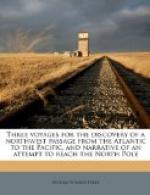With the increasing width of the inlet we had flattered ourselves with increasing hopes; but we soon experienced the mortification of disappointment. The prospect from the crow’s-nest began to assume a very unpromising appearance, the whole of the western horizon, from north round to S.b.E., being completely covered with ice, consisting of heavy and extensive floes, beyond which no indication of water was visible; instead of which there was a bright and dazzling iceblink extending from shore to shore. The western coast of the inlet, however, trended much more to the westward than before, and no land was visible to the southwest, though the horizon was so clear in that quarter, that, if any had existed of moderate height, it might have been easily seen at this time at the distance of ten or twelve leagues. From these circumstances, the impression received at the time was, that the land, both on the eastern and western side of this inlet, would be one day found to consist of islands.
A breeze sprung up from the northward on the morning of the 12th, but the weather was so foggy for some hours that we did not know in what direction it was blowing. As soon as the fog cleared away, so as to enable us to see a mile or two around us, we found that the floe to which we had anchored was drifting fast down upon another body of ice to leeward, threatening to enclose the ships between them. We therefore cast off and made sail, in order to beat to the northward, which we found great difficulty in doing, owing to the quantity of loose ice with which this part of the inlet was now covered. A remarkably thick fog obscured the eastern land from our view this evening at the distance of five or six miles, while the western coast was distinctly visible at four times that distance.
The weather was beautifully calm and clear on the 13th, when, being near an opening in the eastern shore, I took the opportunity of examining it in a boat. It proved to be a bay, a mile wide at its entrance, and three miles deep in an E.b.S. direction, having a small but snug cove on the north side, formed by an island, between which and the main land is a bar of rocks, which completely shelters the cove from sea or drift ice. We found the water so deep, that in rowing close along the shore we could seldom get bottom with seven fathoms of line. The cliffs on the south side of this bay, to which I gave the name of port Bowen, resemble, in many places, ruined towers and battlements; and fragments of the rocks were constantly falling from above. At the head of the bay is an extensive piece of low flat ground, intersected by numerous rivulets, which, uniting at a short distance from the beach, formed a deep and rapid stream, near the mouth of which we landed. This spot was, I think, the most barren I ever saw, the ground being almost entirely covered with small pieces of slaty limestone, among which no vegetation appeared for more than a mile, to which distance Mr. Ross and myself walked inland, following the banks of the stream. Among the fragments we picked up one piece of limestone, on which was the impression of a fossil-shell. We saw here a great number of young black guillemots, and a flock of ducks, which we supposed to be of the eider species.




